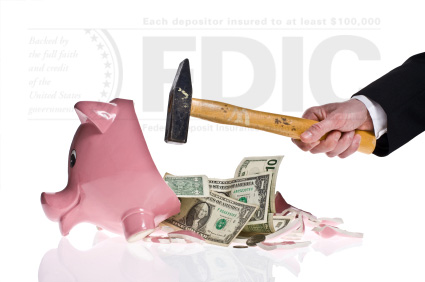What Happens When a Bank Fails
“Bank Failure” is a pretty self explanatory phrase, and with 129 bank failures on the 2010 list it seems like MyBankTracker can’t go a week without reporting one or two additions. But what actually happens when a bank fails?
Your bank has probably made it clear that it is insured by the Federal Deposit Insurance Corporation (FDIC) insured. Every bank in the United States should be FDIC insured. Those that aren’t are either international, run a high risk of being a scam or are not worth your business. If you haven’t already, take a moment to check to see if your bank is FDIC insured:
- Visit the Institution Directory Section of the FDIC website
- Click on the “Find Institutions” link
- Enter your bank’s information to get an updated status report
- You can also visit your bank’s website, where you should find something on the front page (usually at the bottom) or the “About Us” section indicating FDIC status.

If neither of these options work call into your bank and ask the customer services representative. If you find that your bank is not FDIC insured, you might want to look for a new bank. The reason it is necessary to bank with an organization that is FDIC insured is because the FDIC ensures you get your money back in the case of a bank failure.
Why Banks Fail
Banks fail for some of the same reasons that people go bankrupt: They run out of money and no longer can meet their financial responsibilities. Banks fail when they cannot pay bills and they have problems funding depositors who need cash.
Okay, My Bank Failed. Now What?
The term “bank failure” may sound more severe than it actually is. Unless you work for or own the bank that is about to fail there is no need to worry as long as your account is FDIC insured. Banks that are insured pay a certain fee to the FDIC that will be used to repay any losses that depositors have due to a bank failure.
There are certain terms that go into this insurance agreement. The standard amount depositors are insured is up to $250,000 for each account ownership category. The FDIC does not insure risky investments such as securities, mutual funds or stocks. Savings accounts, checking accounts and CDs are typically the types of ownership categories the FDIC insures.
If you have more than $250,000 in your account due to multiple parties on the account you may want to consider getting separate accounts for different family members to avoid losing money. Another option is to hold your money in online bank accounts.
Find the best rates
Unlock exclusive savings rates and gain access to top-tier banking benefits.
What Happens to the Bank
After the bank has failed, the FDIC will come in and attempt to find a healthy bank that can absorb the former bank’s business. This is typically a process that goes unnoticed until the switch is made, at which point depositors get a notice in the mail. If no other banks are able to incorporate the failed bank’s business into their own, this will effect depositors directly because their accounts will be frozen for a few days. If this happens to you, it is inconvenient but there is still no need to worry. The FDIC will make sure you get every penny back by sending you a check for your account balance.
If your bank has failed and you are in the market for a new bank, check out the our bank ratings and reviews to help you make the best decision. You can also found a step-by-step process of what to do when your bank fails.

